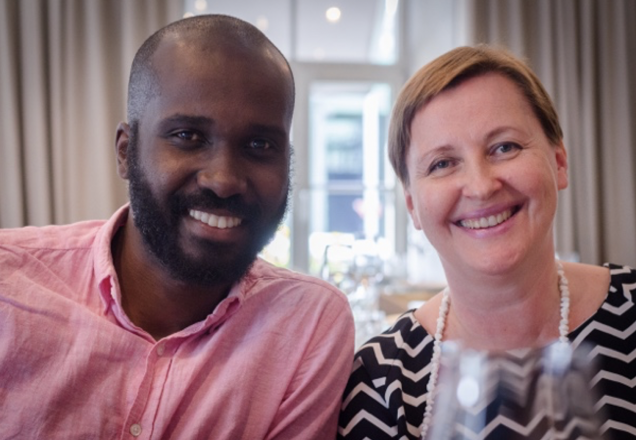Core and Cohort Updates
Admin Core Update
This summer has been a busy one for the Admin Core team! Admin Core staff have spent the summer working virtually alongside investigators from each core and cohort to advance the current projects, analyze data, and prepare manuscripts. The Admin Core has also been working to prepare for the DSMB meeting on September 29, 2020, and setting the date for the next URBAN ARCH Annual Meeting (March 17, 2021). Please click here for our save the date information for the 2021 Virtual Annual Meeting.
Since our last update, Admin Core staff have worked both remotely and in-person to maintain the repository and coordinate shipments. In August, we moved our three large freezers housing our biological samples from the BU Evans Building to their new home in the Evans Biological Research Center. We have successfully sent two shipments to Louisville, KY for testing: one containing plasma and serum samples, and the other containing fecal samples. Two additional shipments were completed in September: Russia ARCH DBS cards were sent to United States Drug Testing Laboratories (USDTL) for PEth testing, and Uganda ARCH ADEPTT plasma samples were sent to Boston University for alanine aminotransferase testing. The repository also received a shipment from St. Petersburg, Russia in August, containing 27 cryoboxes of plasma and serum samples, 4 packages of DBS cards, 1 cryobox of nasal secretion samples, and 2 cryoboxes of fecal samples. For more information on the URBAN ARCH Sample Repository, please visit our repository webpage. If you have questions regarding the URBAN ARCH repository, please contact Natalia Gnatienko.
BDM Updates
The BDM Core has been collaborating extensively on a number of analyses across URBAN ARCH, including the main analyses for the St PETER trial. Core members have also been actively involved in the planning and development of the renewal applications due this fall. The BDM Core is excited to be playing a role in each of the 3 new center proposals.
Uganda Updates
ADEPTT
The aims of the ADEPTT study are to determine the level of toxicity among people with HIV (PWH) receiving TB preventive therapy (isoniazid [INH] preventive therapy [IPT]), by level of alcohol use, as well as adherence and an analysis of the risks and benefits of providing INH to persons consuming alcohol. In June, we were able to resume activities with additional COVID-19 precautions in place. We have continued follow up visits and have only 4 participants remaining on INH. Retention has been excellent. We had completed baseline procedures for all 302 participants enrolled and 291 have completed their six-month visits. Twenty-four participants had discontinued INH due to grade 3/4 level toxicities and three women had discontinued INH due to pregnancy.
Accepted Manuscripts:
- Muyindike W, Fatch R, Cheng DM, Emenyonu NI, Ngabirano C, Adong J, Linas BP, Jacobson KR, Hahn JA. Tuberculin skin test positivity among HIV-infected alcohol drinkers on antiretrovirals in south-western Uganda. PLoS One. 2020.
DIPT
The DIPT study, which aims to determine whether economic incentives contingent on reduced alcohol use reduce heavy alcohol use over six months IPT, is progressing well. Following the pause in all study activities due to COVID-19 restrictions, study activities and INH treatment have been continuing since being reinstated on May 26th, 2020.
At the time of pausing study activities, we had enrolled 487 EtG-confirmed heavy drinkers with latent TB out of our target enrollment of 680.
We are working on analyses and manuscripts from the baseline data, including an analysis of urine EtG results compared to self-report, post-traumatic stress disorder, smoking, and viral suppression.
EXTEND
The main aims of the EXTEND RCT are to estimate the uptake and acceptability, preliminary efficacy, and cost of methods of delivery of an intervention to reduce unhealthy drinking and HIV viral failure among persons in HIV care in rural Uganda (n=270). To date, we have screened a total of 708 patients at the Mbarara ISS Clinic and enrolled 182 participants, and 96 have completed the intervention. Unlike ADEPTT and DIPT, EXTEND was able to continue some study activities with participants remotely.
Russia Cohort Update
The Russia team has completed follow-up at all St PETER study visits with the exception of the 12-month time point. Sixty 12-month visits are still pending and we expect to complete follow-up for St PETER by the end of 2020. The team continues to monitor the evolving situation of the COVID-19 pandemic in St. Petersburg, with guidance from local authorities.
In August, the team received the fifth batch of St PETER, TMAO, ACME, and HIV latency study samples (whole blood, PBMC, plasma, serum, stool, DBS cards, nasal) from Russia.
Due to the COVID-19 pandemic, the team was not able to meet in-person this summer via conferences or site visits. Ongoing weekly virtual study meetings have continued to take place. Here are some photos from summer 2019, in the hopes that we will be able to connect in-person in 2021!




In June and July, the following abstracts were either presented virtually or published in conference materials:
- Public, private, or which way to go? HIV-positive patients’ navigation of addiction care in Saint Petersburg, Russia – a qualitative study. (Vetrova, et al.). International AIDS Society Virtual Conference 2020. Virtual poster presentation.
- Tobacco use and liver fibrosis in HIV-infected Russians. (Fuster, et al.). College on Problems of Drug Dependence (CPDD) 2020. Virtual poster.
- A Longitudinal Analysis of HIV stigma and ART initiation among HIV-positive people who inject drugs in Saint Petersburg, Russia. (Vetrova, et al.). NIDA International Forum 2020. Virtual poster.
- Electronic cigarette use among HIV-positive heavy drinking smokers in Russia. (Yaroslavtseva, et al.). NIDA International Forum 2020. Conference Materials.
- The association between heavy alcohol consumption and trimethylamine N-oxide (TMAO) levels: a cross sectional study. (Mensah, et al.). Research Society on Alcoholism (RSA)/International Society for Biomedical Research on Alcoholism (ISBRA)-2020 Scientific Meeting. Conference materials.
- HIV, alcohol and dysbiosis – Exploring the association between alcohol and dysbiosis among HIV-positive heavy drinkers. (So-Armah, et al.). RSA/ISBRA-2020 Scientific Meeting. Conference materials.
The team is actively pursuing data analyses, abstract submissions, and manuscript preparation.
Published Manuscripts:
- Tindle H, Freiberg MS, Gnatienko N, Blokhina E, Cheng DM, Yaroslavtseva T, Bendiks S, Winter M, Krupitsky EM, Samet JH. Design of a randomized controlled trial of smoking cessation medications for alcohol reduction among HIV-positive heavy drinkers and daily smokers in St. Petersburg, Russia. Contemp Clin Trials Commun. 2020;19:100625.
Boston ARCH Update
The Boston ARCH 4F Cohort Study continues to assess the association between alcohol consumption and falls, fractures, frailty, and physical function among people with HIV infection and substance use disorder. As of September 1, 2020, the Boston ARCH team has completed 251 baseline visits (176 with participants from the original Boston ARCH Bone Cohort and 75 with participants new to the cohort). Follow-up assessments began in June 2018 and are ongoing. As of September 1, 2020, 230 6-month follow-up phone interviews, 177 12-month annual follow-up visits, 137 18-month interim follow-up phone interviews, and 58 24-month annual follow-up visits have been completed.
Due to the COVID-19 pandemic, study enrollment remains paused and the interview portions of annual assessments continue to be conducted through remote data collection by either Zoom or phone call. The portions of the annual assessment that must be done in-person (e.g., balance testing, grip strength, and walking speed) will be completed when in-person research is allowed to resume.
In June, we concluded our qualitative research. Four focus groups that engaged a total of 15 participants were conducted remotely. In total, we completed 5 individual qualitative interviews and 4 focus groups. The qualitative data have been analyzed and will be used to inform the development of a falls prevention intervention.
In addition to continuing Boston ARCH research activities remotely, we received approval from the Boston University Medical Center Institutional Review Board to add a short battery of COVID-related questions to the existing Boston ARCH assessments, to assess the impact of the COVID-19 pandemic on the Boston ARCH cohort. The additional COVID-related questions will be implemented in the upcoming weeks.